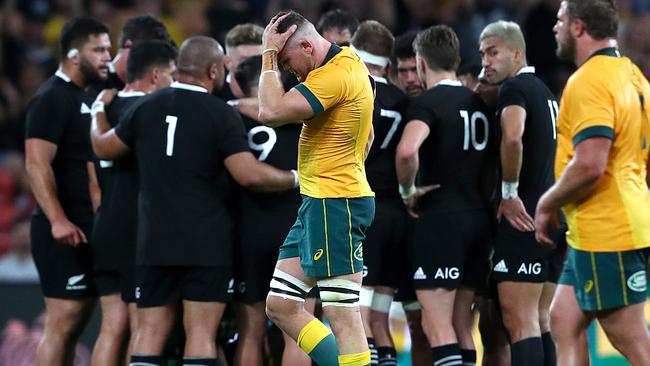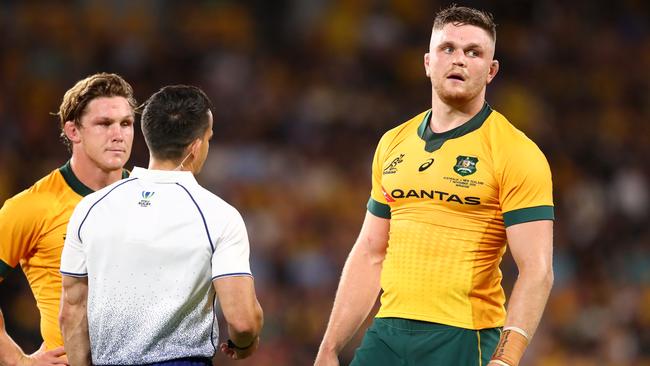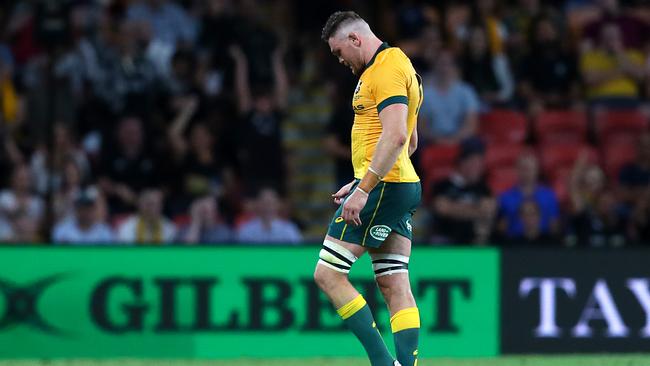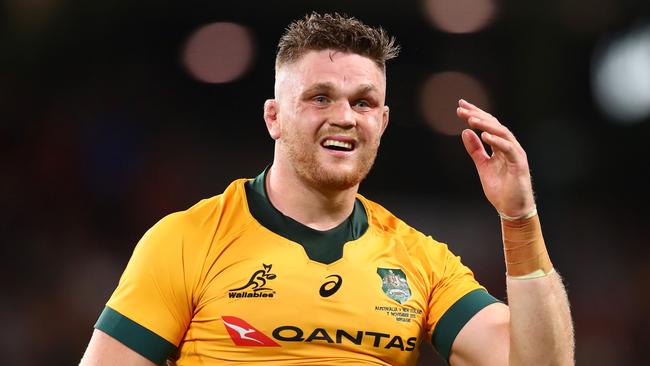Bledisloe Cup: Wallabies rookie Lachie Swinton faces lengthy ban over red card hit
There are growing fears rugby’s crackdown on high hits has moved too far in the other direction – and Wallabies rookie Lachie Swinton could pay a huge price because of it.

Rugby
Don't miss out on the headlines from Rugby. Followed categories will be added to My News.
Wallabies rookie Lachie Swinton could be rubbed out for the rest of the year if he can’t persuade the disciplinary panel to show him some mercy over his controversial red card in Saturday’s Bledisloe Cup clash at Suncorp Stadium.
One of the most exciting young loose forwards in Australia because of his old-fashioned aggression, Swinton’s international career is already hanging in the balance after he was sent off on debut and ordered to front SANZAAR’s Foul Play Review Committee.
Rugby followers on both sides of the Tasman are already shaking their heads bemoaning the softening of the game after Swinton was given his marching orders for his clumsy high shot on All Blacks lock Sam Whitelock.
Watch every match of the 2020 Bledisloe Cup & Tri Nations Live & On-Demand on Kayo. New to Kayo? Get your 14-day free trial & start streaming instantly >

But they will be wondering if rugby’s lost contact with its roots if he cops a lengthy ban that will sideline him until 2021.
Under rugby’s strict new clampdown on hits to the head, that’s exactly what Swinton could be facing, so the hope is commonsense will prevail and the punishment fits the crime.
In Swinton’s case, his right shoulder contacted Whitelock’s jaw as he was attempting to tackle the big Kiwi front-on, but it did not appear to be reckless or malicious.
Whitelock did not require any medical attention and played out the full 80 minutes but by the letter of the law, it was a red card offence that has resulted in Swinton being charged for a dangerous tackle, along with New Zealand prop Ofa Tu‘ungafasi, who was also sent off just 12 minutes earlier.
Both men have been ordered to appear before the review panel via video-conference on Monday where their fates may well depend on what range their dangerous tackles are classified as.
If his is considered low-level, Swinton faces a possible two-match suspension, which can be halved to one with a guilty plea.
But if it’s deemed to be in the mid-range, the mandatory entry point is six matches, which would rule him out of the rest of the Tri Nations series, even with a 50 per cent reduction as the Wallabies have just two matches against Argentina remaining.

Burnt by Reece Hodge’s heavy-handed three-week ban at last year’s World Cup when he was found guilty of a dangerous tackle on Peceli Yato because he didn’t wrap his arms around the Fijian flanker, the Wallabies have adopted a diplomatic line this time.
“It was hard to argue once they got a red card that ours wasn’t a red card, so we’ve just got to take that on the chin,” coach Dave Rennie said.
Wallabies skipper Michael Hopper was also careful not to fan the fire.
“If that’s the interpretation, that’s what’s coming down from up top, we’ve got to be better,” he said.
No-one is disputing that rugby needs to take a hard line on dangerous tackles to the head to protect players from serious injuries but former internationals – from both countries – are now worried that World Rugby officials, based in Ireland, have gone too far.
“That’s a joke,” Fox Sports commentator Greg Martin said.
“If we’re here in Australia competing with rugby league, and that’s what we are, but getting run from someone sitting in an office in Dublin deciding that that’s a red card, that’s nonsense, we can’t win that fight.”
The Rugby Union Players‘ Association chief executive Justin Harrison said the penalties for accidental dangerous tackles should also take into account whether players suffered any injuries.
“We talk about the framework of the rule changes that safety is the intent, but both of these players who received direct shots to the chin weren’t directed to go to the HIA for assessment so let’s talk about mitigating factors,” he said.
Former Wallabies skipper Phil Kearns said the rules should be changed to stem the increase in red cards.
“There’s got to be a better way,” he said.
“For me, yellow card, put them on report and then go to the judiciary afterwards. Ruining the game, ruining the spectacle.”
Even the Kiwis agree.
“I don’t think we should have red cards in rugby,” All Blacks legend John Kirwan said.
“I think we should have a yellow card and ‘on report’ and you suffer later.”
Swinton became the first Wallaby ever to be sent off on debut while Tu‘ungafasi was just the fifth All Blacks to be red carded since New Zealand began playing internationals in 1893. Three of those send-offs have come in the past three years.
“I don’t agree with red cards at all,” Christian Cullen said.
“Ten minutes off, put it on report, someone else can come in. It just ruins the game, seriously.”
RED CARD SHOCKERS SPOIL WALLABIES WIN
Wallabies wins over the All Blacks are so rare these days that the celebrations too easily paper over the cracks.
Saturday’s 24-22 win in the final Bledisloe Cup clash was gutsy stuff which will hopefully mark a turnaround in the team’s fortunes after last weekend’s humiliation in Sydney.
But no-one should be carried away with that performance because it wasn’t a fair dinkum contest.
And that’s not because New Zealand had already wrapped up the series and the match was a dead rubber.
PLAYER RATINGS: MARIKA UNLEASHES THE BEAST
It was because the game was ruined by the officiating. The softening up of rugby has turned the sport into a laughing stock that it’s little wonder fans are turning away.
For anyone who can remember when rugby used to be a test of physical courage, Saturday’s final Bledisloe Cup match at Suncorp Stadium was an embarrassment.
Neither Wallabies debutant Lachie Swinton or All Blacks prop Ofa Tuungafasi should have been sent off for their harmless tackles. A penalty would have sufficed, a yellow card at the most would have done the trick.

Contact sports have an obligation to stop hits to the head but as the rules currently stand, the match officials had no choice other than to issue red cards after they watched all the slow motion replays, which made both incidents look far worse than they were.
But the existing rules need an overhaul because they don’t take into account whether high hits are intentional and what damage they make.
Neither of those two tackles were reckless and neither of the players who were tackled were harmed.
Swinton’s dismissal was especially cruel. On debut, he had been the outstanding player of the first 20 minutes, pulling off a series of bone rattling tackles but now faces the prospect of a suspension. What purpose does that serve him in the game?
It also leaves an asterisk next to Australia’s win. The Wallabies may well have gone on and won the Test fair and square but the record shows that they haven’t beaten New Zealand in a 15 on 15 game since 2017.
Ofa Tuungafasi was given a red card for this shot on Tom Wright...fair call or too harsh?#BledisloeCup #AUSvNZL pic.twitter.com/4xz54pQTtI
— 10 Sport (@10SportAU) November 7, 2020
Last year’s record win by the Wallabies in Perth was against a 14-man All Blacks side after Scott Barrett was unfairly sent off and the Kiwis beat Australia 3-0 in 2018 so no-one can be sure how well they played.
The only thing that is in no doubt is that the Wallabies grow a leg every time they play at Suncorp Stadium so Rugby Australia should be scheduling Bledisloe Cup matches in Brisbane every season.
The All Blacks always play matches against the Wallabies at Eden Park because they know they always win there so Australia should do the same instead of shopping the game around to different stages.
The low turnout at ANZ Stadium last weekend should be the clue for Rugby Australia not to take the biggest game of the season back to Sydney until the Wallabies have got the Bledisloe Cup back in their possession, which may not be that far away.

